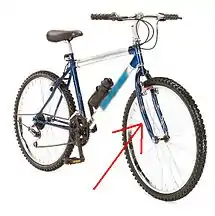dakša
See also: dakšā
Latvian

Dakšas (1)

Velosipēda dakša (2)
Etymology
From Proto-Baltic *daš-, with a suffix -kā and š-k metathesis (compare also dialectal daška; there are also dialectal forms like dasti with a suffix -to instead of -kā), from Proto-Indo-European *deḱ (“to pluck, sever, split”). Cognates include Norwegian tagge, German Zacke (“spike”), Middle Low German tagge, Dutch tak (“branch”), English tack.[1]
Pronunciation
| (file) |
Noun
dakša f (4th declension)
- (usually in the plural) fork, pitchfork (pronged tool with a long straight handle used for lifting, throwing (especially hay))
- dakšu kāts ― fork shaft
- uzdurt salmu klēpi uz dakšām ― to stick a fork into the straw
- izcelt kartupeļus ar dakšām ― to dig out potatoes with a fork
- divzaru, trīszaru, četrzaru dakšas ― two-, three-, four-pronged fork
- divžuburu, trīsžuburu, četržuburu dakšas ― two-, three-, four-pronged fork
- siena, mēslu, dārza, kartupeļu dakšas ― hay, manure, garden, potato fork
- (usually in the singular) part of a machine composed of two parallel branches
- velosipēda dakša ― bicycle fork
- motocikla priekšējā dakša ― front motorcycle fork
Usage notes
In the “pitchfork” sense, the plural form dakšas is more frequently used than the singular form dakša, though the latter is still attested.
Declension
Declension of dakša (4th declension)
Derived terms
References
- Karulis, Konstantīns (1992), “dakša”, in Latviešu Etimoloģijas Vārdnīca (in Latvian), Rīga: AVOTS, →ISBN
This article is issued from Wiktionary. The text is licensed under Creative Commons - Attribution - Sharealike. Additional terms may apply for the media files.